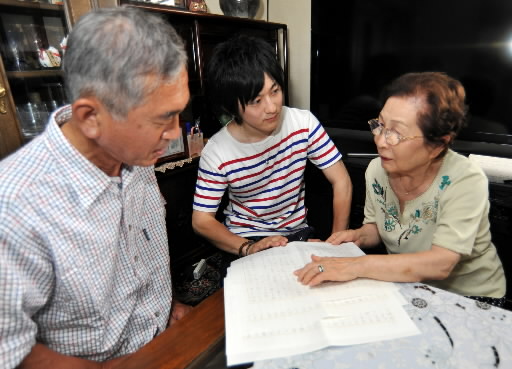The Motomachi District, 65 Years After the Atomic Bombing, Part 2: Survivors Today [2]
Jul. 29, 2010
Part 2: Survivors Today
Article 2: Blast severed family ties
by Sakiko Masuda, Staff Writer
A-bomb story provides new ties to descendents
In the Motomachi district in Naka Ward, Hiroshima, an area near the hypocenter of the atomic bomb, reside a number of people who survived the bombing of sixty-five years ago. Today, some are looking back on their lives. Some are finally beginning to relate their experiences to their children and grandchildren. Some are cared for by family members, while some of these atomic bomb survivors (hibakusha) care for one another. The second part of this special series "The Motomachi District" will introduce the current circumstances involving individual hibakusha who struggle to go on with their lives.
In the Motomachi district in Naka Ward, Hiroshima, an area near the hypocenter of the atomic bomb, reside a number of people who survived the bombing of sixty-five years ago. Today, some are looking back on their lives. Some are finally beginning to relate their experiences to their children and grandchildren. Some are cared for by family members, while some of these atomic bomb survivors (hibakusha) care for one another. The second part of this special series "The Motomachi District" will introduce the current circumstances involving individual hibakusha who struggle to go on with their lives.
Encouraged by her son, the mother wrote about her experience of the atomic bombing of 65 years ago. Blown into the air by the atomic blast; the smell of human bodies being cremated; her lack of fear at the sight of flames in the dead of night.
Her story filled four pages. While writing, she was concerned about being able to convey her experience clearly. But her grandson, who read her account, told her, "From your writing, I could understand well how awful the atomic bombing was."
Yuriko Zaima, 84, lives alone in an apartment building in Motomachi. For this interview, her eldest son Norimasa, 61, and grandson Yosuke, 21, a college senior, joined her. At the time of the bombing, Ms. Zaima was 19 and working for the Hijiyama Army Marine Artillery Corps Command. Officers were instructing her how to extract oil from pine trees when the blast occurred. She was knocked unconscious and when she came to, she found herself pinned under the wreckage of a barracks. Her head was wounded and the right half of her dress was drenched in blood.
Ms. Zaima thought back to her sister, Chiyoko, who was three years older. "On the morning of August 6, I had a fight with my sister, who said I had used something of hers without asking. We left home that day without making up."
Two days after the bombing she received permission to leave her post and headed through the ruins on foot. When she reached her home, her sister wasn't there. A month later, one of her sister's co-workers told her that her sister had died in the bombing: she was crushed by the collapse of the building where she worked.
Ms. Zaima married a man who worked for the former Japan National Railways. At first they lived in Iwakuni, 40 kilometers from Hiroshima, but when her mother, who had a clothing shop, decided to restore the business, they returned to Hiroshima. Her mother's store was originally near Hiroshima train station, but was forced to relocate due to an extension of the road in that area. Thus, in 1953, the store, along with their residence, was moved to Motomachi.
For more than 30 years Ms. Zaima then managed the shop, selling clothing and fabric. Nearby were various shops selling tempura, produce, and other things. It was a busy place, with many women shopping at the stores. Ms. Zaima, however, did not talk about the bombing with her customers. Despite the fact that a number of A-bomb survivors were living in the Motomachi district, both Ms. Zaima and her customers refrained from mentioning their experiences.
Since her husband's death, she has lived alone. From the window of her apartment, she can see the lush greenery of Hiroshima City Chuo Park. She decorates her unit with collages of colored paper that she makes as a hobby. Chatting with neighbors is another pleasant pastime.
At times, amid her days, she abruptly wonders what life would have been like if the atomic bomb had not fallen on Hiroshima, how she would have walked with her sister through town and enjoyed shopping with her. The atomic bomb deprived her of the ties of family, something she was forced to reconstruct after the war. Norimasa, who understands his mother's sorrow and hardship, suggested that she record her account of the bombing for her grandson Yosuke and the members of his generation.
Every August 6, Ms. Zaima visits Peace Memorial Park and prays in front of the Cenotaph for the A-bomb Victims. She is thinking of asking Norimasa and Yosuke to accompany her this year.
(Originally published on July 26, 2010)








